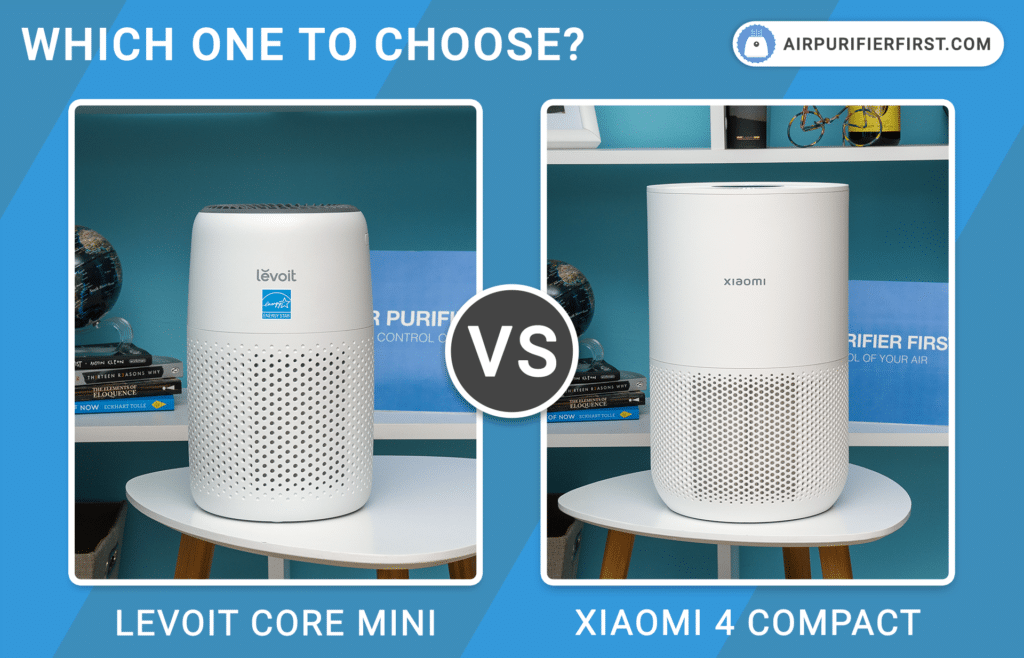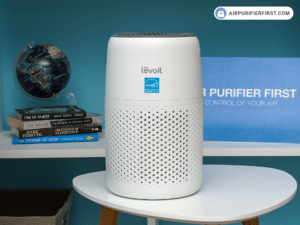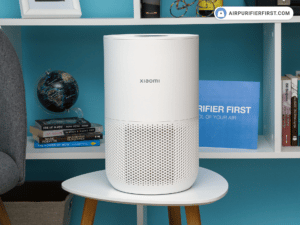I got many inquiries about my opinions of the Levoit Core Mini and Xiaomi 4 Compact air purifiers. So, in this article, I will compare their performance, noise levels, operating costs, and features to determine which is the better option for buyers.

Levoit and Xiaomi are reliable, trusted, and well-known brands in the air purifier industry. So, in terms of trustworthiness, you won’t regret whichever you choose. However, these two models I compare today don’t have many things in common.
The Levoit Core Mini is a small air purifier with a room coverage of only 71 sq. ft. On the other hand, the Xiaomi 4 Compact covers rooms of up to 206 sq. ft. Not only is the Xiaomi suitable for larger rooms, but it also features a larger filter, more features, and is an overall much more powerful air purifier.
What I like about Xiaomi are the air quality sensor, air quality indicator, smart app, and auto mode features, which aren’t included in the Core Mini. Both air purifiers utilize a three-stage filtration technology, don’t produce ozone, and are 100% safe to use.
Levoit Vs Xiaomi Specifications
 |
 |
|
| Manufacturer | Levoit | Xiaomi |
| Model | Core Mini | 4 Compact |
| Dimensions | 6.5 x 6.5 x 10.4 inches (16.4 x 16.4 x 26.4 cm) | Φ8.6 x 14 inches (Φ22 x 35,5 cm) |
| Room Coverage | 71 sq. ft. | 206 sq. ft. |
| Performance Ratings | ||
| Filtration Technology | Pre-filter, HEPA Filter, and Activated Carbon Filter | Primary Filter, Xiaomi’s High Efficiency-Filter, and Activated Carbon Filter |
| Filter Replacement Indicator | Yes | Yes |
| Filter Longevity | 4-6 months | 6-12 months |
| Power | 7W | 27W |
| Operating Costs Ratings | ||
| Working Modes | 3 – Speed 1, Speed 2, and Speed 3 | 3 – Automatic Mode, Sleep Mode, and Manual Mode |
| Air Quality Sensor | No | Yes |
| Air Quality Indicator | No | Yes |
| Auto Mode | No | Yes |
| Smart App | No | Yes |
| Voice Control | No | Yes |
| Noise Levels | 41.8 – 53.6 dBA | 41.3 – 60.4 dBA |
| Noise Ratings | ||
| Warranty | 2-year | 1-year |
| In-Depth Review | Levoit Core Mini | Xiaomi 4 Compact |
| Price | Check Price on Amazon | Check Price on Amazon |
Which One Does It Better?
After analyzing all the specifications, features, and test results, it is clear that the Xiaomi 4 Compact is a much better option than the Levoit Core Mini and my absolute buying recommendation.
The Xiaomi has many more features; it performed better in all tests, uses a Xiaomi’s High Efficiency-Filter, and is a much more powerful device.
If you have any questions about these two air purifiers, please feel free to leave a comment in the comment box below.
Leave a Reply